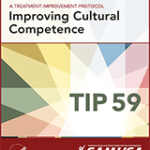Evidence about the impact of cultural competence training on client health and mental health outcomes is generally inconclusive.
- Five systematic reviews, including one review of reviews, all published within the past ten years, concur that existing studies lack adequate methodological rigor to draw conclusions about the impact of cultural competence training and programming. Additionally, existing studies have produced contradictory results, showing either a positive impact or no impact. These systematic reviews have examined cultural competence training in general, not specifically as it relates to resettled refugees.
Virtual and experiential refugee-specific cultural competence training approaches show promising results.
- Several studies have examined changes in health care provider attitudes, knowledge, and/or skills associated with refugee-specific cultural competence training. These studies have examined virtual and/or experiential learning. The studies have found improvements primarily in providers’ attitudes such as empathy and confidence in providing care. However, these studies all used uncontrolled pretest-posttest or posttest-only designs; thus, their findings are only suggestive and promising for further research.




